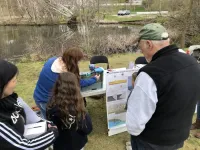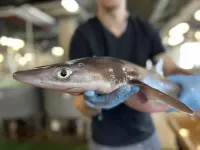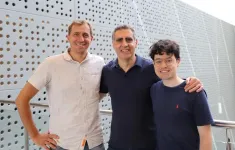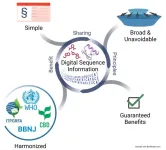(Press-News.org) Generative artificial intelligence tools like ChatGPT, an AI-powered language tool, and Midjourney, an AI-powered image generator, can potentially assist people with various disabilities. These tools could summarize content, compose messages or describe images. Yet the degree of this potential is an open question, since, in addition to regularly spouting inaccuracies and failing at basic reasoning, these tools can perpetuate ableist biases.
This year, seven researchers at the University of Washington conducted a three-month autoethnographic study — drawing on their own experiences as people with and without disabilities — to test AI tools’ utility for accessibility. Though researchers found cases in which the tools were helpful, they also found significant problems with AI tools in most use cases, whether they were generating images, writing Slack messages, summarizing writing or trying to improve the accessibility of documents.
The team presented its findings Oct. 22 at the ASSETS 2023 conference in New York.
“When technology changes rapidly, there’s always a risk that disabled people get left behind,” said senior author Jennifer Mankoff, a UW professor in the Paul G. Allen School of Computer Science & Engineering. “I'm a really strong believer in the value of first-person accounts to help us understand things. Because our group had a large number of folks who could experience AI as disabled people and see what worked and what didn't, we thought we had a unique opportunity to tell a story and learn about this.”
The group presented its research in seven vignettes, often amalgamating experiences into single accounts to preserve anonymity. For instance, in the first account, “Mia,” who has intermittent brain fog, deployed ChatPDF.com, which summarizes PDFs, to help with work. While the tool was occasionally accurate, it often gave “completely incorrect answers.” In one case, the tool was both inaccurate and ableist, changing a paper’s argument to sound like researchers should talk to caregivers instead of to chronically ill people. “Mia” was able to catch this, since the researcher knew the paper well, but Mankoff said such subtle errors are some of the “most insidious” problems with using AI, since they can easily go unnoticed.
Yet in the same vignette, “Mia” used chatbots to create and format references for a paper they were working on while experiencing brain fog. The AI models still made mistakes, but the technology proved useful in this case.
Mankoff, who’s spoken publicly about having Lyme disease, contributed to this account. “Using AI for this task still required work, but it lessened the cognitive load. By switching from a ‘generation’ task to a ‘verification’ task, I was able to avoid some of the accessibility issues I was facing,” Mankoff said.
The results of the other tests researchers selected were equally mixed:
One author, who is autistic, found AI helped to write Slack messages at work without spending too much time troubling over the wording. Peers found the messages “robotic,” yet the tool still made the author feel more confident in these interactions.
Three authors tried using AI tools to increase the accessibility of content such as tables for a research paper or a slideshow for a class. The AI programs were able to state accessibility rules but couldn’t apply them consistently when creating content.
Image-generating AI tools helped an author with aphantasia (an inability to visualize) interpret imagery from books. Yet when they used the AI tool to create an illustration of “people with a variety of disabilities looking happy but not at a party,” the program could conjure only fraught images of people at a party that included ableist incongruities, such as a disembodied hand resting on a disembodied prosthetic leg.
“I was surprised at just how dramatically the results and outcomes varied, depending on the task,” said lead author Kate Glazko, a UW doctoral student in the Allen School. “In some cases, such as creating a picture of people with disabilities looking happy, even with specific prompting — can you make it this way? — the results didn’t achieve what the authors wanted.”
The researchers note that more work is needed to develop solutions to problems the study revealed. One particularly complex problem involves developing new ways for people with disabilities to validate the products of AI tools, because in many cases when AI is used for accessibility, either the source document or the AI-generated result is inaccessible. This happened in the ableist summary ChatPDF gave “Mia” and when “Jay,” who is legally blind, used an AI tool to generate code for a data visualization. He could not verify the result himself, but a colleague said it “didn’t make any sense at all.” The frequency of AI-caused errors, Mankoff said, “makes research into accessible validation especially important.”
Mankoff also plans to research ways to document the kinds of ableism and inaccessibility present in AI-generated content, as well as investigate problems in other areas, such as AI-written code.
“Whenever software engineering practices change, there is a risk that apps and websites become less accessible if good defaults are not in place,” Glazko said. “For example, if AI-generated code were accessible by default, this could help developers to learn about and improve the accessibility of their apps and websites.”
Co-authors on this paper are Momona Yamagami, who completed this research as a UW postdoctoral scholar in the Allen School and is now at Rice University; Aashaka Desai, Kelly Avery Mack and Venkatesh Potluri, all UW doctoral students in the Allen School; and Xuhai Xu, who completed this work as a UW doctoral student in the Information School and is now at the Massachusetts Institute of Technology. This research was funded by Meta, Center for Research and Education on Accessible Technology and Experiences (CREATE), Google, an NIDILRR ARRT grant and the National Science Foundation.
For more information, contact Glazko at glazko@cs.washington.edu and Mankoff at jmankoff@cs.washington.edu.
END
Can AI help boost accessibility? These researchers tested it for themselves
2023-11-02
ELSE PRESS RELEASES FROM THIS DATE:
UMass hydrogeologists develop innovative way to predict saltwater intrusion into groundwater using Plymouth, Mass. as test case
2023-11-02
November 2, 2023
UMass Hydrogeologists Develop Innovative Way to Predict Saltwater Intrusion into Groundwater Using Plymouth, Mass. as Test Case
Working closely with local conservation group, researchers develop new model to predict climate-change driven saltwater intrusion that is transferable to other vulnerable coastal communities
AMHERST, Mass. – As the world warms and ice sheets melt, the ocean continually rises. The greater Boston area can expect to see between one and six feet of sea level rise by 2100, according to recent ...
Looking sharp! Shark skin is unique and may have medical use, too
2023-11-02
By David L. Chandler
WOODS HOLE, Mass. -- Sharks differ from other fish in many ways, including an apparently remarkable ability to heal from wounds, according to reports of sharks recovering from injuries sustained in the wild. While this healing ability has not yet been documented in controlled laboratory conditions, some of the chemical compounds found in shark skin may have significant biomedical potential.
To investigate this possibility, two dermatology researchers from the Karolinska Institute in Sweden carried out research on a small shark, the spiny dogfish (Squalus acanthias) and other cartilaginous fish species at the ...
A known environmental hazard can change the epigenetics of cells
2023-11-02
Epigenetics, the chemical mechanisms that controls the activity of genes, allows our cells, tissues and organs to adapt to the changing circumstances of the environment around us. This advantage can become a drawback, though, as this epigenetic regulation can be more easily altered by toxins than the more stable genetic sequence of the DNA.
An article recently published at Science with the collaboration of the groups of Dr. Manel Esteller, Director of the Josep Carreras Leukaemia Research Institute ...
Golden Retriever Lifetime Study data uncovers potential connection between sterilization, hemangiosarcoma
2023-11-02
DENVER/Nov. 2 – A scientific analysis published in Veterinary and Comparative Oncology using Golden Retriever Lifetime Study data notes a potential correlation between canine sterilization and hemangiosarcoma development. This startling finding has been previously suggested by experts but still is poorly understood.
The authors note that the likelihood of diagnosing hemangiosarcoma appears consistently low across all sexes and neutering statuses until about eight years of age. Beyond this point, intact and neutered male ...
Herbivory limits vegetation restoration success at sites worldwide, new meta-analysis shows
2023-11-02
Excluding herbivores – or reintroducing their predators – may aid restoration efforts in many locations, suggests a new meta-analysis of more than 600 global studies. According to the analysis, herbivores at restoration sites reduced vegetation abundance by 89%, on average, a larger effect than they had at relatively undisturbed sites. Herbivores also suppressed plant diversity at these locations. Vegetation is a primary foundation of most ecosystems. However, in many, it has been dramatically degraded, contributing to the loss of biodiversity and ...
Southern hemisphere dominates decline in global water availability
2023-11-02
Driven in part by large-scale atmospheric climate modes, the Southern Hemisphere accounts for more than 95% of the recent decline in global water availability, according to a new study. Global land water availability has varied due to climate change and increased human water use. Although this crucial resource underpins livelihoods, socioeconomic development, and ecosystems worldwide, it remains unclear how water availability has changed in recent decades and what is driving these changes at a global scale. Yongqiang Zhang and colleagues combine various data, including streamflow observations of large river basins of ...
Researchers caution that biodiversity benefit-sharing needs a radically new approach
2023-11-02
At the 2022 COP-15 meeting, signatories of the Convention on Biological Diversity reached a new agreement called the Kunming-Montreal Global Biodiversity Framework, which contained provisions to establish a separate, multilateral benefit-sharing mechanism for the use of “digital sequence information” (DSI), that is, the biological data associated with, or derived from, genetic resources such as nucleotide sequences and epigenetic, protein, and metabolite data.
In a new Policy Forum analysis published ...
Research outlines how sex differences have evolved
2023-11-02
Francis Crick Institute press release
Under strict embargo: 18:00hrs GMT Thursday 2 November 2023
Peer reviewed
Observational study
People and animals
Researchers at the Francis Crick Institute and Heidelberg University in Germany have shown that sex differences in animals vary dramatically across species, organs and developmental stages, and evolve quickly at the gene level but slowly at the cell type level.
Mammals have different traits depending on sex, like antlers in male deer. These are known as ‘sexually dimorphic’ traits, and include differences which aren’t visible, ...
UCLA researchers develop solid-state thermal transistor for better heat management
2023-11-02
A team of researchers from UCLA has unveiled a first-of-its-kind stable and fully solid-state thermal transistor that uses an electric field to control a semiconductor device’s heat movement.
The group’s study, which will be published in the Nov. 3 issue of Science, details how the device works and its potential applications. With top speed and performance, the transistor could open new frontiers in heat management of computer chips through an atomic-level design and molecular engineering. The advance could also further the understanding of how heat is regulated in the human body.
“The precision control of how heat flows through materials has been a long-held ...
Good news, bad news on dental pain care seen in new study
2023-11-02
Americans who have a tooth pulled or another painful dental procedure in the United States today are far less likely to get opioid painkillers than they were just a few years ago, a new study shows.
That’s good news, since research shows that opioids are not necessary for most dental procedures.
But the COVID-19 pandemic seems to have thrown a wrench into the effort to reduce opioid use in dental care – and not just in the few months after dentists and oral surgeons started providing routine care again after a pause in spring 2020.
The decline in opioid prescriptions filled by dental patients was much faster in the pre-pandemic ...







